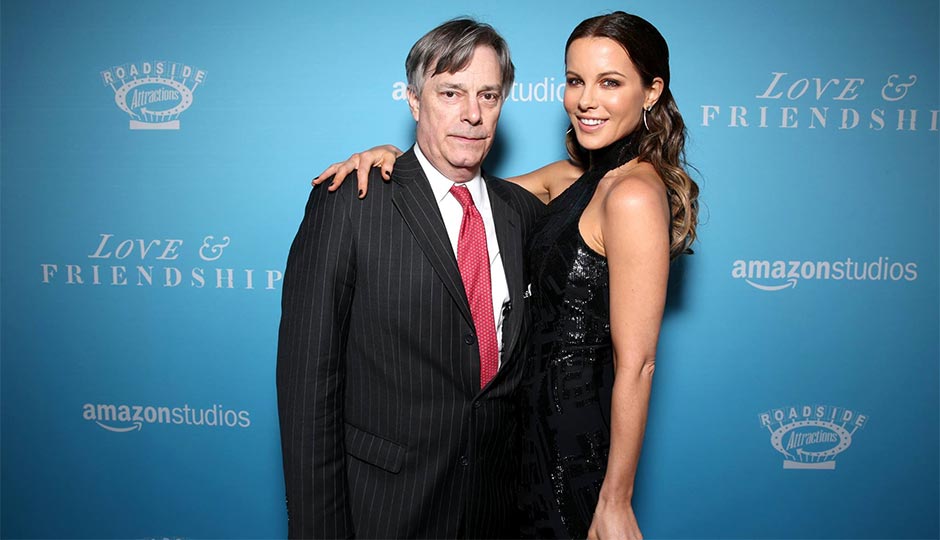5 Questions: Whit Stillman on Love & Friendship

Whit Stillman, director of “Love & Friendship,” with star Kate Beckinsale.
Whit Stillman has been making films since his sparkling debut, Metropolitan, back in 1990, but it has taken until now for him to find the perfect literary muse for his brand of hyper-verbose, witty ruminations. Critics who first questioned the pairing of the modernist filmmaker and the writing of Jane Austen didn’t see how deeply connected their work was. Both are droll and keen observers of human nuance, but they also share a love of characters who use their loquaciousness either to mask their true feelings or to reveal far too much of them. His new film, Love & Friendship, based on a very early Austen novella that was never published in her lifetime, stars Kate Beckinsale as the wily, conniving widow Lady Susan, who hatches a plan to marry her daughter off to someone of wealth, while reserving a second rich husband for herself, in the form of the doofy, brilliantly confused Sir James Martin (Tom Bennett, in a command performance). Based in New York, Stillman trekked the short distance down to Philly and spoke with us about his Austen connection, casting an anti-heroine, and the joy of watching Tom Bennett at work.
There seems to be an obvious connection between your work and Austen’s, but why did you opt for one of her more obscure works to adapt?
I was straight hopeful about this because I just like everything she does so much and I agree with her point of view as far as I know it, in every way. I know from her private correspondence that she was a Tory, while I was a Whig. But despite our political differences, in everything I just like her point of view. This work was ideal for adaptation because it wasn’t quite finished or known. Normally, when things are not quite finished or known, they also not very good, but this was the ideal combination of not really finished, not really known, but with incredibly good things in it. So it gave us a lot of good things, but it also gives the freedom to make it into a film without showing that much trace of where it came from.
Since it was unfinished and sort of raw, did you have to add new material and characters to make it work?
I knew I wanted not just what was in the novel but also new things around it. I hadn’t come up with that much. I came up with a character, Mrs. Cross, that I enjoyed — the friend in difficult circumstances who works as her maid without compensation, out of friendship. That started as a device to have someone around to listen to the funny things Lady Susan was going to be saying about arriving at Churchill. It had to be someone within earshot. Then Mrs. Cross started taking on her own personality. She’s just a horrible sycophant. She’s sort of in love with Lady Susan, trying to get a little bit of her aura.
Another character who got more filled out was Tom Bennett’s hilarious Sir James. Did you realize how funny he was going to be?
I think part of the thing about that was after his first scene, when we don’t know who he is, and then he sort of establishes himself. After that first scene, he didn’t even have to say anything. He would come into frame and I would start to giggle. Everything he was doing, the walk, the mannerisms, how he picks up a magazine. He was so in character in the most humorous way. It was a sort of masterclass of comedy.
In some ways, Lady Susan is a very unlikely Austen heroine. She’s conniving, and kind of awful to her daughter, and has a low opinion of almost everyone. Were you worried she was too much — that she would turn the audience off?
You know what I think her saving grace is? She doesn’t lie to herself about what she’s doing at all. She’s totally honest with herself and those near her. She’s bad, but she’s a lot of fun, and we’re whores for entertainment. We’re cheap dates, man. I always have people worrying about this: “Oh, how can you have these two, such unsympathetic characters.” I always try to remind people of how much everyone enjoyed Dirty Rotten Scoundrels. Those weren’t virtuous or admirable people, but we know that. It’s film. We’re enjoying it.
You worked with Kate Beckinsale before, back in 1998. Was she always the actress you had in mind for Lady Susan?
I always thought she was the obvious person for it. When I started working on it, it was not long after [The Last Days of Disco]. I said if this goes through, still she’s far too young. But I sort of knew with my composition process, she’d probably be the right age by the time I finished.
Love & Friendship opens at the Ritz Five on May 20th.
Piers Marchant is a film critic and writer based in Philly. Find more confounding amusements and diversions at his blog, Sweet Smell of Success, or read his further 142-character rants and ravings at @kafkaesque83.


